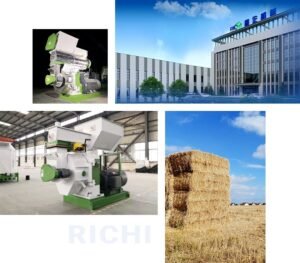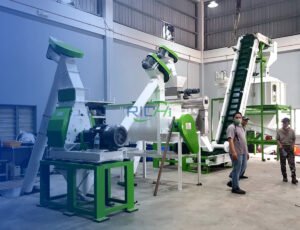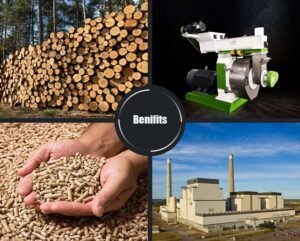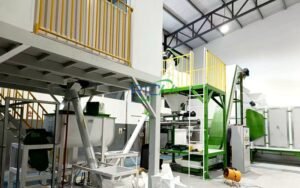Introduction to Wood Pellet Processing Equipment
Wood pellet processing equipment is essential machinery used in the production of wood pellets, which are a form of biofuel. These machines are designed to compress biomass materials, such as sawdust, wood chips, and agricultural residues, into cylindrical pellets. Wood pellets are a renewable energy source, used extensively for heating, power generation, and as an alternative to fossil fuels in various industrial applications.
Uses of Wood Pellet Processing Equipment
The primary use of wood pellet processing equipment is to convert raw biomass into a compact, energy-dense form that is easy to store, transport, and use. These pellets are commonly used in:
- Residential Heating: Wood pellets are widely used in pellet stoves and boilers for heating homes.
- Industrial Power Generation: Wood pellets are increasingly being used as a substitute for coal in power plants, contributing to a reduction in carbon emissions.
- Commercial Heating: Many commercial facilities, including schools and hospitals, use wood pellet boilers for heating.
- Animal Bedding: The compact nature of wood pellets makes them ideal for use as bedding material in animal husbandry.

Industry Applications and Data Analysis
The global wood pellet market has been growing steadily, driven by increased demand for renewable energy sources and government incentives for biomass utilization. According to recent market data, the global wood pellet market size was valued at approximately USD 8.9 billion in 2022 and is expected to reach USD 15.5 billion by 2027, growing at a compound annual growth rate (CAGR) of 11.2%.
In terms of production, Europe is the largest market, accounting for over 60% of the global wood pellet production, followed by North America and Asia-Pacific. The industrial sector is the largest consumer of wood pellets, accounting for about 65% of the total consumption, primarily driven by the use of pellets in co-firing and dedicated biomass power plants.
Classification of Wood Pellet Processing Equipment
Wood pellet processing equipment can be classified into several types based on their functions in the pellet production line:
- Wood Chippers: These machines reduce the size of wood logs and branches into smaller, manageable pieces.
- Hammer Mills: Used for further size reduction, hammer mills grind the chipped wood into finer particles.
- Pellet Mills: The core of the wood pellet production line, pellet mills compress the wood particles into dense pellets.
- Coolers: Post-production, the pellets are hot and need to be cooled to ensure their quality and durability.
- Screeners: These are used to separate fines and dust from the finished pellets, ensuring a uniform product.
- Packaging Machines: Finally, packaging machines bag the pellets for transport and sale.
Working Principle and Process Flow
The wood pellet production process typically follows these steps: https://www.richimanufacture.com/biomass-pellet-production-line/
- Material Preparation: Raw materials such as wood logs, sawdust, or agricultural residues are collected and pre-processed using wood chippers and hammer mills to achieve the desired particle size.
- Drying: The biomass is then dried to reduce its moisture content to below 15%, which is ideal for pelletizing.
- Pelletizing: The dried material is fed into a pellet mill where it is compressed under high pressure and temperature to form pellets. The pellets are then extruded through a die with the desired pellet size.
- Cooling: After pelletizing, the pellets are cooled using a cooler to reduce their temperature and harden them.
- Screening: The cooled pellets are screened to remove any fines or broken pellets.
- Packaging: The final product is then bagged using a packaging machine, ready for distribution.
How to Choose Wood Pellet Processing Equipment
When selecting wood pellet processing equipment, several factors need to be considered:
- Production Capacity: Determine the required production capacity based on your operational needs. This will guide the selection of the appropriate size and type of pellet mill and associated equipment.
- Raw Material: The type of raw material (e.g., softwood, hardwood, agricultural residues) affects the choice of equipment. Some materials may require additional processing, such as debarking or additional grinding.
- Energy Efficiency: Opt for energy-efficient machines to reduce operational costs and improve the overall profitability of the production line.
- Automation Level: Depending on the scale of production, choose equipment that offers the desired level of automation, which can reduce labor costs and increase consistency.
- Durability and Maintenance: Ensure that the equipment is robust and easy to maintain, as this will minimize downtime and prolong the machine’s lifespan.
Selecting a Supplier: Key Considerations
When choosing a supplier for wood pellet processing equipment, it’s crucial to consider the following:
- Customization Capabilities: Look for suppliers that offer customized solutions tailored to your specific needs. This includes the ability to design a pellet production line according to your site layout and operational requirements.
- Experience and Expertise: Choose a supplier with extensive experience in the industry and a proven track record of successful installations.
- After-Sales Support: Reliable after-sales support is essential to ensure the smooth operation of the equipment. This includes technical assistance, spare parts availability, and maintenance services.
- Turnkey Solutions: Some suppliers offer turnkey project services, handling everything from design and installation to commissioning and training.
Introducing Richi Machinery Company
Richi Machinery Company is a leading manufacturer of pellet processing equipment and the largest pellet production line manufacturer in Henan, China. With years of experience in the industry, Richi Machinery specializes in providing customized pellet production lines designed to meet the specific needs of each customer.
Richi Machinery’s offerings include:
- Customized Production Lines: The company designs pellet production lines tailored to the customer’s site layout, ensuring optimal performance and efficiency.
- Turnkey Project Expertise: Richi Machinery offers comprehensive turnkey solutions, handling every aspect of the project, from initial design to final commissioning.
- Advanced Technology: The company utilizes cutting-edge technology in its equipment, ensuring high efficiency, durability, and ease of operation.
- Strong After-Sales Support: Richi Machinery is known for its reliable after-sales service, providing ongoing support and maintenance to ensure the longevity and performance of its equipment.
Practical Application Value of Wood Pellet Processing Equipment
The practical application value of wood pellet processing equipment lies in its ability to convert low-value biomass into high-value fuel, contributing to energy sustainability and environmental conservation. The use of wood pellets as a renewable energy source reduces dependence on fossil fuels, lowers greenhouse gas emissions, and supports the circular economy by utilizing waste materials.
In industrial applications, wood pellets offer a cost-effective alternative to coal and natural gas, providing a cleaner burning fuel with lower emissions. In residential and commercial heating, wood pellets offer a convenient and efficient heating solution, with the added benefit of being environmentally friendly.
Conclusion
Wood pellet processing equipment plays a vital role in the growing biomass energy industry, offering a sustainable solution for energy production. By choosing the right equipment and supplier, businesses can optimize their production processes, reduce costs, and contribute to a greener future. Richi Machinery Company stands out as a leading supplier, offering customized, turnkey solutions that meet the diverse needs of the global market.






